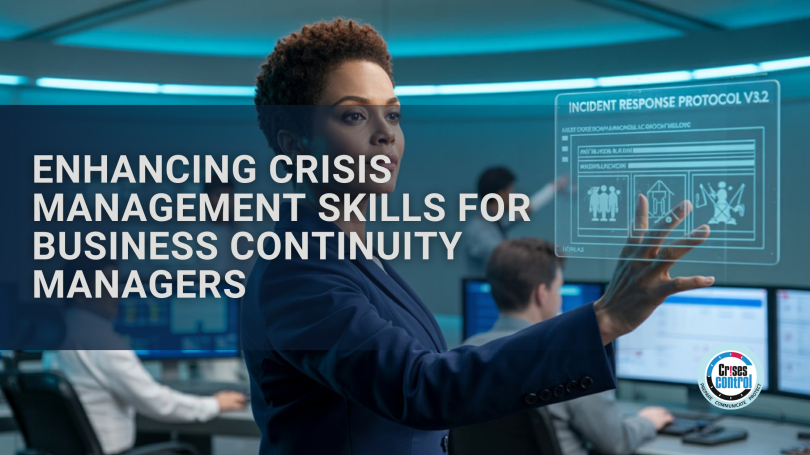Why is your role as a Business Continuity Manager so crucial? Your decisions directly affect employee safety, operational continuity, and your organisation’s reputation. In essence, you’re the guardian of business resilience, and your skills and expertise are the tools that safeguard your organisation from harm. In this blog, we’ll delve into the essential skills every Business Continuity Manager should develop, empowering you to excel in crisis management.
The Vital Role of a Business Continuity Manager
A crisis can strike at any moment, and when it does, all eyes turn to the Business Continuity Manager. Picture this: a cyberattack paralyses your organisation’s IT systems, or a natural disaster disrupts your supply chain. It’s at these critical junctures that your role takes centre stage. You become the orchestrator of response efforts, ensuring that the organisation weathers the storm and emerges stronger on the other side.
Decision-Making Under Pressure
Effective communication is paramount during a crisis, and as a Business Continuity Manager, you must be a master communicator. You’ll need to convey complex information clearly and concisely to a variety of stakeholders, including employees, customers, and government officials. Your ability to explain the crisis situation, the organisation’s response plan, and the next steps is vital for a coordinated response.
But it doesn’t stop at communication. Your role demands quick and effective decision-making in high-pressure environments. You must weigh the risks and benefits of different options and make the best choices for your organisation. The decisions you make can have far-reaching consequences, affecting not only the bottom line but also employee safety and public perception.
Problem Solving and Leadership
Crisis situations often come with a myriad of problems, and as a Business Continuity Manager, you must be a skilled problem solver. You’ll need to identify and address issues quickly and efficiently, often thinking outside the box to find creative solutions. Your ability to navigate these challenges can be the difference between a swift recovery and prolonged disruption.
In addition to problem-solving, your leadership skills will be put to the test. You must inspire and motivate your teams during a crisis, providing calm and collected guidance when the pressure is on. Your teams should feel confident and supported under your leadership, knowing that you have a plan and are ready to execute it.
Developing Your Skills for the Future
As a Business Continuity Manager, you play a pivotal role in safeguarding your organisation. To enhance your crisis management skills, consider the following tips:
1. Get Certified
Professional certifications in business continuity management are widely available. Earning a certification can demonstrate your expertise and commitment to potential employers and clients. Consider the Certified Business Continuity Professional (CBCP), the Certificate of the Business Continuity Institute (CBCI), and the ISO 22301 Business Continuity Management (BCM) Professional. These certifications are all recognised and respected by employers in the UK, and in the world. They demonstrate that a person has the knowledge and skills necessary to develop and implement effective business continuity plans.
2. Attend Training Courses
Crisis management is a dynamic field, with best practices constantly evolving. Attend training courses to stay updated on the latest trends and strategies. Consider the courses that the Disaster Recovery Institute International (DRII) offers.
3. Network
Connect with other business continuity professionals to learn from their experiences and share your own. Joining professional organisations and online forums can provide valuable insights. A relevant organisation is the Association for Continuity Professionals (ACP), based in the US.
4. Stay Informed
Read books and articles on crisis management to stay informed about the latest developments and best practices.
5. Learn from Others
When other organisations face crises, take the opportunity to learn from their responses. What worked well? What could have been done better? These insights can inform your own crisis management plan.
6. Embrace Technology
Technology plays a pivotal role in effective crisis management. It’s no longer enough to rely solely on traditional methods; incorporating the right tools into your crisis management strategy is essential.
- Incident Management Tools: These tools are your Swiss army knife for crisis handling. They provide a centralised platform to streamline communication, incident tracking, and resource allocation. With incident management tools, you can respond swiftly, allocate resources efficiently, and track the progress of your crisis response in real-time.
- Emergency Mass Notification Systems: In a crisis, time is of the essence. Mass notification systems ensure that critical messages reach your employees, stakeholders, and relevant authorities promptly. These systems offer various communication channels, from SMS and emails to push notifications and social media alerts. By adopting emergency mass notification systems, you can achieve faster response times, which are often crucial in mitigating the impact of a crisis.
Integrating these technologies into your crisis management arsenal empowers you to respond more effectively, minimise downtime, and safeguard your organisation’s reputation.
Conclusion
Being a Business Continuity Manager isn’t just a role; it’s a responsibility that directly impacts your organisation’s safety, stability, and reputation. The skills discussed in this blog – clear communication, quick decision-making, creative problem-solving, strong leadership, and technology adoption – are your toolkit for safeguarding your organisation through crises. As the storm subsides, your organisation can emerge even stronger, and Crises Control is here to help you do just that.
Crises Control is your partner in building a resilient future. Discover how our advanced Incident Management Tools and Emergency Mass Notification Systems can enhance your crisis management capabilities. Request a live demo today. Together, we’ll ensure your organisation is ready to face any challenge and emerge stronger on the other side.
